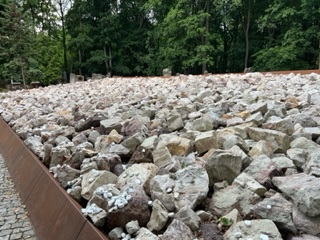To be frank, Warsaw is a city that, for most of my life, didn’t cross my mind often. It was one of those cities that could be added to a list of the many places in Europe touched by war, tragedy, and loss, but I certainly didn’t realize the extent or significance of this loss.
Being here and walking the streets of Warsaw has made me acutely aware of how untouched by war my own home is. This is a fact that, on the surface, seems obvious. War hasn’t been waged on U.S. soil in a real, destructive way for (arguably) over a century. But it isn’t something I really thought about. I hadn’t consciously considered the lack of destruction before, the same way you can’t miss something you’ve never known.
Here, you can’t ignore the echoes of the past. At home, I can go days on end without thinking of war, but it’s irrevocably woven into the fabric of this nation and city in ways that are sometimes subtle, and sometimes painfully visible.
Walking (or driving) through Warsaw, there are preserved historic buildings that bear the face of destruction. There are newer inscriptions of historical events and tragedies on large stones at street corners. There are commemorative plaques. There are sobering reminders of personal losses: stones placed on graves or monuments.



Beyond the physical, though, there are people carrying a more abstract loss all around the city. A Rabbi from the Nożyk Synagogue spoke to us on Monday, and he said something that struck me. He mentioned that in the U.S., it’s common that we have large families. Here, it isn’t. Jews in Warsaw are much fewer in number than before, but Jews in Warsaw with large extended families? Nearly impossible. Everyone lost someone.
This is an echo of the past that spans generations. Losses that can’t be quantified riddle this place, these people, this nation.
I realize this seems to be heading in a direction that would evoke despair, but this is possibly the most incredible thing of all: people are not living in daily despair. This loss is a part of them, of course, but it isn’t them. People still carry on living with hope and passion and fervor and pride, and it would be unfair and inaccurate to reduce a people to their loss.
It seems like every time we learn about another tragedy Jews here endured, it’s followed up by the reminder that we aren’t here to dwell on tragedy but to ensure it isn’t for nothing. We have the ability to carry it in a meaningful way; it’d be a disservice not to.
Our tour guide at POLIN museum said it best: “We will not define the life of a people by their end.” There’s a before that matters, and there’s an after that matters, too. We have the reigns when it comes to this after. We get to choose what we do with the time and influence we have. Echoes of the past may permeate this place, but so do dreams for the future.
